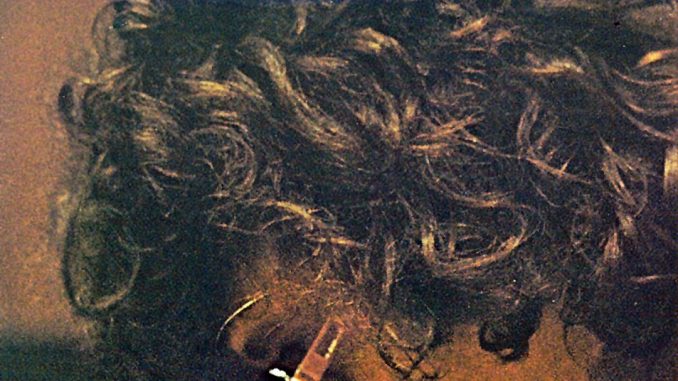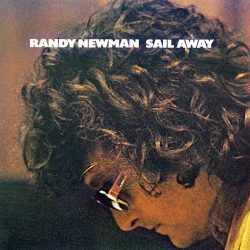
A unique voice and – for once – it’s no exaggeration.
 In a number of previous articles, I have let it be known that I have great admiration for Randy Newman and I suggested that the album, ‘Good Old Boys’, was the fifth best americana album of all time. It does sound weird when you say it like that! I further suggested that there was a golden patch somewhere between 1970 and 1977 with four albums, ‘12 Songs’, ‘Sail Away’, ‘Good Old Boys’, and, ‘Little Criminals’. It was clear then as it is now that on a given day any one of those albums could have made that list or this article. Time though to focus on, ‘Sail Away’.
In a number of previous articles, I have let it be known that I have great admiration for Randy Newman and I suggested that the album, ‘Good Old Boys’, was the fifth best americana album of all time. It does sound weird when you say it like that! I further suggested that there was a golden patch somewhere between 1970 and 1977 with four albums, ‘12 Songs’, ‘Sail Away’, ‘Good Old Boys’, and, ‘Little Criminals’. It was clear then as it is now that on a given day any one of those albums could have made that list or this article. Time though to focus on, ‘Sail Away’.
Stephen Erlewine sums up Newman’s unique attraction thus:
“An anomaly among early ’70s singer/songwriters, Randy Newman may have been slightly influenced by Bob Dylan but his music owed more to New Orleans R&B and traditional pop than folk. Newman developed an idiosyncratic style that alternated between sweeping, cinematic pop and rolling R&B, which were tied together by his intelligently biting sense of humour. Where his peers concentrated on confessional songwriting, Newman drew characters, creating a world filled with misfits, outcasts, charlatans, and con men. Though he occasionally showed sympathy for his characters, he became well known for his acidic sense of satire”.
I’d suggest that there are some other musical influences there as well but we will come to that later. As it stands Newman’s career divides into three parts with his early work by far the best and if there was a turning point it came with the 1979 album, ‘Born Again’, and if the cover was not enough of a warning then listening to the disc left no doubts. Allmusic has this to say in part of their review of an album they also do not rate highly,
‘The Story of a Rock and Roll Band” is a hilarious and deadly accurate parody of the Electric Light Orchestra (admittedly an easy target, but still beautifully executed)’,
Hilarious?? Even if it’s a pastiche of ELO it still sounds like ELO and is therefore not very interesting and certainly not amusing. It seems a soft and rather irrelevant target and we know Newman can do better.
Newman’s later ‘serious’ work loses its spark and try as I might I can’t get away with albums such as, ‘Harps and Angels’, (to be fair there are those that would disagree with me) even though I have spent good money in the attempt.
The third part of his career is, of course, the film soundtracks and whilst it could be argued that its light stuff it is, by and large, very good light stuff and, ‘You’ve Got a Friend‘ is a good example. Clearly, Newman’s family background via uncles Albert and Lionel is one of film music and it was no surprise that he should end up there. That jaunty piano style was made for such as, ‘Toy Story’, – at the same time if you want lachrymose then he can clearly do that too.
Every song on, ‘Sail Away’, is a gem and the stories they tell could merit an article each, by way of investigation and hopefully some explanation. It’s a true lesson in the craft of songwriting and one that so many modern and aspiring artists would do well to consider. It’s not devoid of ‘poor me’ but at least he can keep it in bounds and look at the world outside of himself.
Much of the album’s material might be called quickly to account today and it’s something of a surprise that he hasn’t been retrospectively hung drawn and quartered for writing a song like, ‘Sail Away,’ which with its tongue firmly in its cheek offers transportation into slavery as though it were some kind of delightful tourist package; there’s thankfully still a place for irony. It is the case, bizarrely enough, that there were those who tried at the time and subsequently to portray plantation life as a positive benefit for all and a model of social stability. As an inversion of the truth, it’s quite breathtaking,
‘In America, you get food to eat / Won’t have to run through the jungle / And scuff up your feet / You just sing about Jesus and drink wine all day / It’s great to be an American’.
Wrapped up in Newman’s cynical view of the world is a clear longing for times past – something that comes to us all eventually – although it’s always wise not to be too fixed on any one interpretation of his work. Things seem better in the, ‘Dayton Ohio’, of 1903 (recorded by, of all people, Billy J Kramer) and perhaps they were for some,
‘Sing a song of long ago / When things were green and movin’ slow / And people stopped to say hello / Or they’d say hi to you / Would you like to come over for tea / With the missus and me’?
Here’s a thought from ‘greatscott’ on the song meanings site as to what may be hidden behind this pleasant facade:
‘The Dayton Strangler was active during this period. The singer is trying to convince this person to “come over for tea,” but this could be a ploy to get the person to come over for more nefarious purposes’.
And that’s the way Newman can get you – you’re never quite sure.
‘Gods Song’, and, ‘All His Love’, make it clear that Newman sees the Lord as a mischievous (or is that malicious) puppet master who laughs at the faith of mankind. Particularly in, ‘Gods Song’, he makes it clear how ridiculous it is that despite the unnecessary and avoidable privations visited upon us that we manage to characterise them as the gift of free will or some mysterious plan about which we have no comprehension whilst having the privilege to be involved. That baffling paradox is, it seems, why God loves us, he fucks with us and we love him for it.
‘I burn down your cities-how blind you must be / I take from you your children and you say how blessed are we / You all must be crazy to put your faith in me / That’s why I love mankind’
or
‘He knows how hard we’re trying / He hears the babies crying / He sees the old folks dying / And he gives us all his love.
Whilst the bleak, ‘Old Man’, doesn’t blame the deities it takes the view that the dying man needs no one, and no one needs him. “You don’t need anybody / Nobody needs you”. It’s bleak. ‘Lonely at the Top’, was apparently aimed at / written for Frank Sinatra although he never recorded it. Despite the jaunty vaudeville nature of the music, it’s a less than happy tale of a man who has everything but companionship. ‘You can Leave Your Hat On’, and, ‘Last Night I had a Dream’, offer thoughts on relationships with the former floating somewhere between creepy and erotic as the narrator assures us that he knows what love is – “you give me a reason to live”. ‘Last Night….’, to be honest, I have never been quite sure about that one. For a man who despite his wit, deft characterisations and wordplay is usually straightforward in meaning, this is something of a rather obscure departure.
‘Political Science’, asks why, “no one likes us”, (America we assume) and Newman’s answer might lie somewhere between what you do and what you say? Lyrically it has a, ‘Dr. Strangelove’ feel to it – thankfully at least we get to know that Australia is saved. You might feel that it’s a Trumpian anthem (how would that sound ringing out at one of his rallies?) that’s ahead of its time although, in reality, Trump waved a big stick and rarely if ever used it. Let’s be thankful for that.
“No one likes us, I don’t know why / We may not be perfect, but heaven knows we try / But all around even our old friends put us down / Let’s drop the big one and see what happens”.
The best-known track – at least to a certain generation – might be, ’Simon Smith and His Amazing Dancing Bear’, which conjures images of showmen, fairs or vaudeville theatres and an act to marvel at, laydees and genelmen! Whilst it’s apparently a happy, almost desperately so, simple affair it’s still possible to see behind it the kind of ordinary man that Newman worries about so regularly – whilst still expressing affection.
The album is no more than 30 minutes long and the songs are brief though within that brevity a lot of tale is told. There’s the usual additional material on the more recent CD releases but nothing that adds much to the original. Although Newman’s rather stylised piano is the lead instrument, and it can become a little wearing over time, he often seemed to gather together a great group of supporting musicians. In this case Ry Cooder, Russ Titelman Jim Keltner, Gene Parsons, Earl Palmer, Chris Ethridge, Wilton Felder, Jimmy Bond and Milt Holland. It’s the writing that lifts this album to classic status and there’s no one quite like Newman with the ability to tell a story, create characters and present convincing often surprising narrative standpoints that are still imbued with irrefutable truth. It’s so much more than I love her / I don’t love her / she loves me / she don’t.
I mean – yes – we know all that stuff.



Great review, Gordon…”that’s the way Newman can get you – you’re never quite sure” is such a perfect summation/explanation of the genius of the man. He ought to be taught in schools and colleges, to ensure that students realise there are no easy answers to anything. The fact he does it in brief, catchy songs…totally agree about his golden period too, although I’ve enjoyed some of his later stuff in patches, and his song about Putin is perfect, and perfectly Newman, too.
Glad you enjoyed the article Jonathan – I gues no artist can always produce top notch work throughout a careeer but Newman has way more than his share of great moments
I sometimes wonder if he and Jake Thackeray were separated at birth?